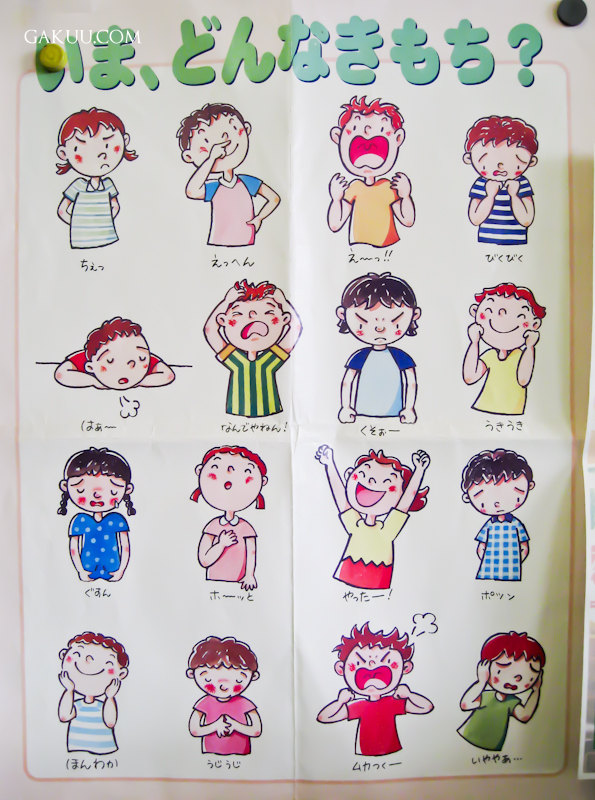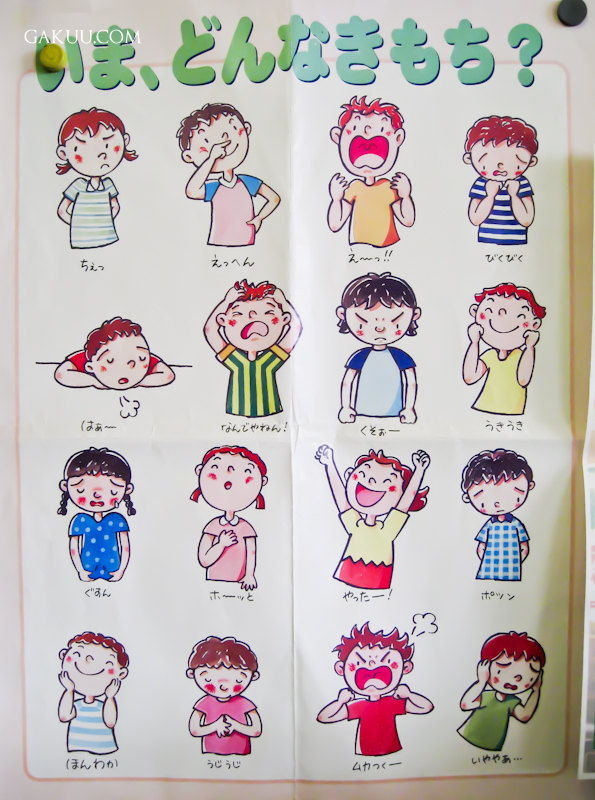Expressing feelings in Japanese is sometimes as simple as just stating the obvious – ‘I’m happy’ (嬉しい!). But quite often we hear many colourful variations that range from onomatopoeic words to verbs and even different dialects! Here are a few of them.

The phrase at the top of the poster reads:
今どんな気持ち?
(In hiragana: いまどんなきもち?)
Basically: How are you feeling right now?
Below it you’ll see a variety of words with their accompanying physical expressions. Associating words with pictures and emotions is one of the strongest ways you can really remember things, so we advise you try to picture these things happening in your head as you practice the words. Even better if you find examples of them in drama, anime, manga or best of all, real life!
ちぇっ
This is like tut-tutting (sucking your tongue against your teeth in disapproval). We wouldn’t usually say the word ちぇっ in Japanese, but for example, when talking about somebody who made the sound, we can use it to express their action:
男の人はちぇっと舌打ちした。 The man tutted (in disapproval).
When the word is clearly said and not sounded by someone, it’s more like a ‘Damn it!’, or ‘By gum!’ if you’re still living in old England.
えっへん
Here is example of a word usually used on its own to draw attention. As you can tell by the picture, it expresses smugness or pride. ‘Look what I did!‘ or ‘Take notice!‘. It also might be used as えっへへ to show smug laughter. Apparently this is the 顔文字 (かおもじ – emoticon) to express it: ( ̄^ ̄).
A) ああ!ゴールだ!すごいね、さとしくん!
B) えっへん。大したことじゃないよ。
A) Ah! Goal! You’re great, Satoshi!
B) Heh. It was nothing.
え〜〜っ!!
This is regularly heard every day in Japan. Used more often by women (and especially girls of the younger generation in high-pitched tones), it expresses shock or disbelief. ‘What!?‘ or ‘Really!?‘. Even if the speaker isn’t really shocked, they may say え〜〜!! anyway just to fit-in with the crowd and continue the conversation. It’s almost relegated to be a filler in some conversations with no deep meaning attached at all.
A) かおりちゃん、彼氏できたって
B) え〜〜!うそ、マジで!?
A) I heard Kaori got a new boyfriend.
B) What!? No way!
(マジで is slang for 本当に?(ほんとうに) – Really?)
びくびく
びくびく is an onomatopoeic word that symbolises being afraid or timid. You might imagine it to be the sound of a person shaking in fear.
びくびくしながら見ていた。
I watched with my heart in my mouth.
That’s not all! Log in to see the rest of this lesson.
Or if you aren’t a member yet, please consider signing up.

Leave a Reply